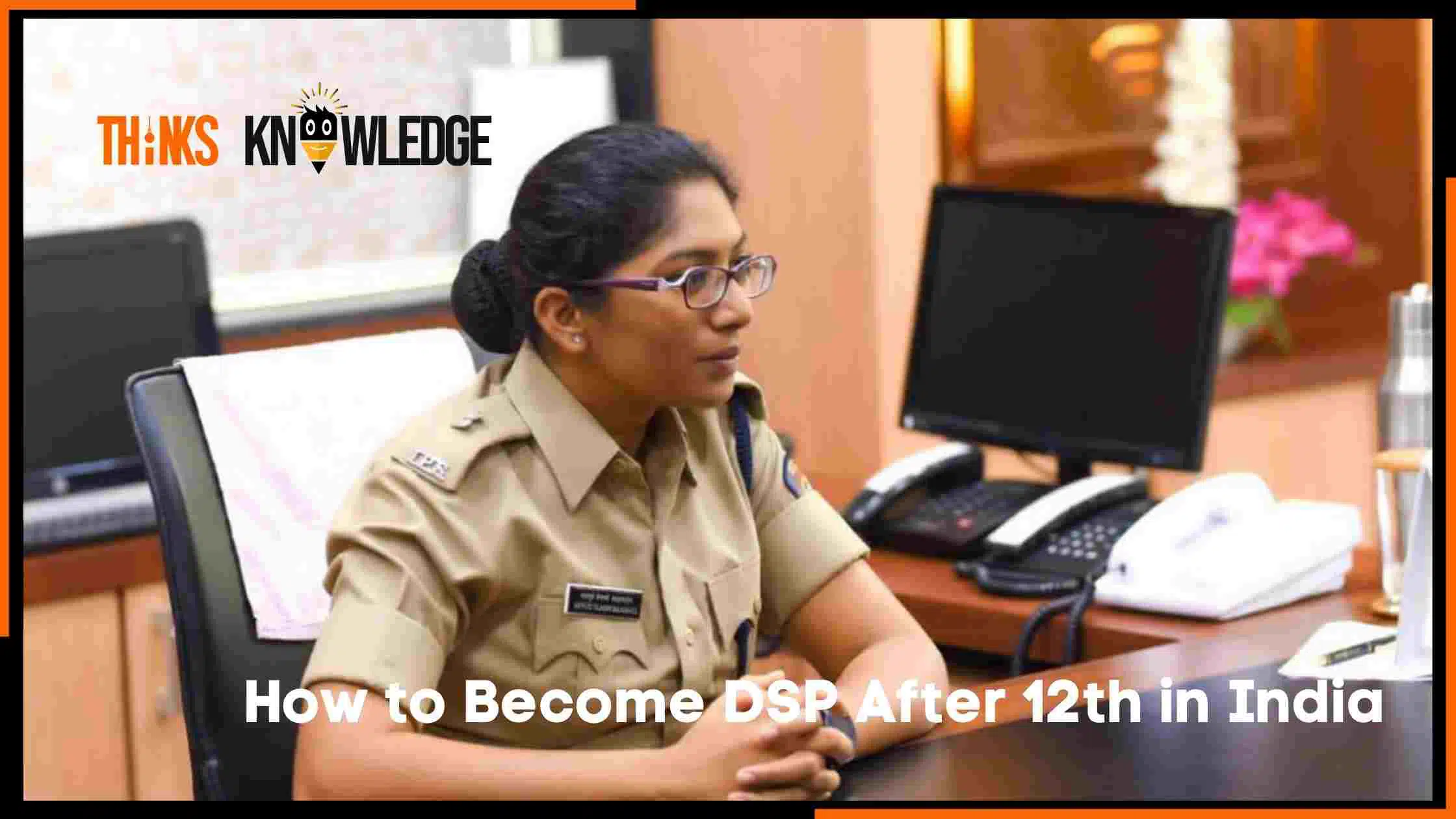There are many career options available after passing class 12th. Here in this article, I am sharing with you the details about How to become DSP After passing class 12th. We will get to know the complete required eligibility criteria that are mandatory to have to apply for the vacancy and its complete selection process. After all this, we will also career scope and overall career growth in this field etc. Let’s see the complete details below.
Well, the DSP is a reputed post in the Indian Police Service. To Join Police Department is one just need to have pass class 12th in any stream. There one can apply for after passing class 12th like Constable, Clerk, Technician & Driver and more etc. Well, here in this we will get to know the about the How to become Deputy Superintendent of Police After the 12th.
Table of Content
Ways to Become DSP After 12th in India:
First of all, I would like to clear out that there is no way to become DSP after passing class 12th. The DSP is an IPS rank post and to appear for the selection, A candidate must have done graduation in any stream from any government recognized University, College or Institute etc. To become DSP, There are basically two ways to become. One can appear for any of these examinations:
- Civil Service Examination
- State Civil Service Commission etc
Both are conducted by the Union Public Service Commission. The Selection through the Civil Service Examination or State Civil Service Commission is done in the following phases:
- Preliminary Examination
- Mains Examination
- Interview
- Medical & Physical for Police Department etc

There is no direct way to become DSP, after clearing the Civil Service Exam, One will join the service as a ASP (Assistant Superintendent of Police) on the basis of the perform in the service and on the basis of the duty period, One will be promoted to the rank of DSP (Deputy Superintendent of Police). There are some required eligibility criteria that is mandatory to have to apply for the CSE (Civil Service Examination). Here are the complete details about the educational Qualification, Age Limit and relaxation criteria for the reserved categories candidates.
visit us- How to Become Police Officer in India
Eligibility Criteria to Appear for CSE:
- A candidate must be graduate in any stream from any government recognized Institute, University or college etc.
- The marks of the candidate in class 12th should be at least 55%.
- A candidate must be at least 21 years old to apply for this and it should not be more than 30 years old for general categories candidates.
- There are some relaxation has been given in age to the candidate who belongs to the OBC and SC/ST categories. The details ate given below:
| Categories | Age Relaxation |
| For SC/ST/OBC | 5 years |
| For Ex-Servicemen | 3 years |
| For NCC Cadet Corps instructor | 5 years |
Through the Civil Service Examination. One can join the IAS (Indian Administrative Service), IPS (Indian Police Service) and IFS (Indian Foreign Service) and some other branches as well. To join the Police department, there are some physical and medical requirement is also there.
Visit us- How to Become an IPS Officer After 12th
Physical Requirement for Police Department:
- Height: Minimum 168cms for Men and 155cms for women
- Weight: According to the height and age of the candidate
- Chest: Minimum 84cms and Chest expansion of 5cms
- Eye Sight: 6/6 or 6/9 for distant good vision
Physical Efficiency Test:
After the Written Exam and Interview, One will also have to appear for the Physical Fitness Test or Physical Efficiency Test etc. here are the activities or tests that one has to appear for:
- 100 meters run in 15sec
- 800mtrs run 170 seconds
- Shot put (7.2kgs) 5.60mtrs
- Long Jump 3.80mtrs
- High Jump 1.20mtr etc
Syllabus and Pattern of CSE UPSC:
As you know now that, one will need to clear three phases of the exam. The syllabus and exam pattern of each phase of the exam is different. Here are the Brief details of the Civil Service Preliminary Exam and Mains Exam.
Preliminary Exam:
| Paper | No. of Questions | Time Duration | Marks |
| General Studies Paper 1 | 100 Questions | Two hours | 200 |
| General Studies Paper 2 | 80 Questions | Two Hours | 200 |
Mains Exam:
There is a total of seven papers in the Civil Service Mains Examination. One will need to attempt every question in the paper except optional. One will need to prepare:
- Main History
- Medical Science
- Geography
- Philosophy
- Electrical Engineering
- Law
- Economics
- Mathematics
- Geology
This is the syllabus and pattern of the Civil Service examination. I hope you get an answer for How to become Deputy Superintendent of Police after the 12th. There is no other way to join the Police department as an DSP except Civil Service Examination. It will be very beneficial for you if you start your preparation for the Civil Service Exam after the 12th. You will have a lot of time to prepare for each subject. Now let’s see the details about the duties Salary, Overall payscale and Allowances a DSP gets in the service.
Duties of DSP in India:
It is hard to mention the exact duty of the DSP but there are number of duties that a DSP has to perform. Here is the following duties of DSP in the service.
- Investigation related job and duty
- Prevention of crime and preserving security and peace
- The detection of crime
- Maintenance of law and order
- The enforcement of major, minor, social legislation and special acts
- Intelligence collection
- Maintenance of police records
- Assistance to other police departments
- Miscellaneous responsibilities and duties etc
DSP Salary, Payscale & Allowances:
The Salary in te police deparment depends on many factor. It depends on the Job Location, Duty Timing and years of experience one has etc. They get paid well, when posted in any risky zone. Here is the list of salary of Clerks, SI (Sub-Inspector), DSP and SP etc. Check the box below:
| Posts | 6th CPC | 7th CPC |
| Clerk & Accounting | Pay Scale: 5,200-20,200
Grade Pay: Rs 2,800 Initial Basic Pay: Rs 8,000 |
Initial Basic Pay: Rs 29,200
Monthly Gross Salary: Rs 40,000-52,000 |
| Sub Inspector (SI) | UP SI Salary:
Pay Scale: 9,300-34,800 Grade Pay: Rs 4,200 Initial Basic Pay: Rs 13,500 |
Initial Basic Pay: Rs 35,400
Monthly Gross Salary: Rs 49,000-64,000 |
| DSP | Pay Scale: 15,600-39,100
Grade Pay: Rs 5,400 Initial Basic Pay: Rs 21,000 |
Initial Basic Pay: Rs 56,100
Monthly Gross Salary: Rs 78,000-96,000 |
| SP | Pay Scale: 15,600-39,100
Grade Pay: Rs 7,600 Initial Basic Pay: Rs 23,200 |
Initial Basic Pay: 78,800
Monthly Gross Salary: Rs 1,10,000-1,35,000 |
| UP Police Post Name | UP Police Salary under 7th Pay Commission in INR |
| Head Constable | 15,600 – 60,600 |
| Assistant Sub-inspector | Up to Rs.60,600 |
| UP Police Sub Inspector Pay Scale | 27,900 – 1,04,400 |
| Inspector | 27,900 – 1,04,400 |
| Assistant Commandant | 46,800 – 1,17,300 |
| Deputy Commandant | 46,800 – 1,17,300 |
| Second-in Commandant | 1,17,300 |
| Commandant | up to 2,01,100 |
| DIG | Up to 2,01,000 |
| IG | 1,12,000 to 2,01,000 |
| ADG | Up to 2,25,000 |
| SDG | 2,25,000 to 2,30,000 |
| DG | 2,50,000 |
There are many benefits that one gets in the service after the salary. Here is the list of allowances that one gets for himself as well for the family memebers etc:
- Dearness allowance
- Medical Allowances
- Leave Encashment Facility
- Detachment Allowance
- Admissibility, quantum & Commutation Allowance
- City Compensatory Allowance
- High Altitude Allowances
- Additional retirement benefits
- Annual survivor benefits
- HRA, TA, DA & quarter in case of the Police Constables or Sub-Inspectors etc
This is all about it and we hope you got the details about How to become DSP after 12th. Pass your class 12th, pursue graduation in your interested subjects and start your preparation for civil service examination.
Visit us- How to Become an IRS Officer
FAQs For How to Become DSP After 12th in India
How to become DSP in Delhi Police?
What is the salary of a DSP in Delhi Police?
What is the power of DSP in India?
Investigation of Crime.
Maintenance of law & Order.
Enforcement of Special and Local Laws etc.





